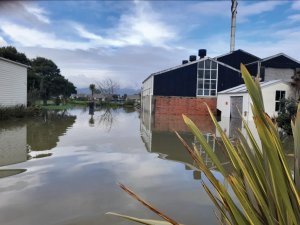Respiratory physician Lutz Beckert considers chronic obstructive pulmonary disease management, including the prevention of COPD, the importance of smoking cessation and pulmonary rehabilitation, and the lifesaving potential of addressing treatable traits. He also discusses the logic of inhaler therapy, moving from single therapy to dual and triple therapy when indicated, as well as other aspects of management
Cascade of impacts, an ambitious plan - Already vulnerable people at highest risk from climate change
Cascade of impacts, an ambitious plan - Already vulnerable people at highest risk from climate change

One aspect of this is improving access to quality healthcare, including to mental health services and primary healthcare
"Cascading, compounding and aggregate impacts…urgent, ambitious, accelerated action.”
A broad and in-depth global scientific collaboration has upped the ante on climate change.
The effects on settlements, infrastructure, supply chains and services of wildfires, floods, droughts, heatwaves, storms and sea-level rise are here and ever increasing, says the latest report from the Intergovernmental Panel on Climate Change (IPCC).
“Successful adaptation requires urgent, more ambitious and accelerated action and, at the same time, rapid and deep cuts in [climate-warming] greenhouse gas emissions,” says the 18-chapter report.
Climate Change 2022: Impacts, Adaptation and Vulnerability is a project of the IPCC Sixth Assessment Report: Climate Change 2022, still in progress.
The voluminous update released on 28 February says “green” infrastructure and ecosystem approaches are economically and ecologically feasible.
Adaptions suggested include: disincentivising developments in highrisk areas; addressing existing social vulnerabilities; building sea walls; developing coastal wetlands; elevating houses; and moving people and development inland in “staged and managed” retreats.
Released late last month, the report contains an Australasian chapter that says some people and businesses will be displaced, and people at highest risk are likely to be groups who are already vulnerable.
The need to factor equity into solutions is highlighted. So, too, is the value of Aboriginal and Torres Strait Islander peoples and tangata whenua Māori passing down knowledge about climate-change planning that promotes collective action and mutual support.
Debbie Wilson has been leading Ministry of Health policy work on health infrastructure, and agrees: “We won’t get anywhere without our indigenous knowledge, which aligns very much with a regenerative world view.”
Specialist GP Dermot Coffey, co-convenor of OraTaiao NZ Climate & Health Council, calls for elevating mātauranga Māori knowledge as climate-change mitigation and adaptation strategy is developed, and learning from Māori culture and practices to promote collective climate action.
In a media release, Dr Coffey points out the report stresses the need for “inclusive development choices that prioritise risk reduction, equity and justice”.
“One aspect of this is improving access to quality healthcare, including to mental health services and primary healthcare, particularly for marginalised groups, to make us more resilient to climate-change effects.”
Dr Wilson points out the Climate Change Response (Zero Carbon) Amendment Act 2019 requires certain organisations, including government and local government, to assess their climate risks. A ministry team – now based at the interim Health New Zealand – is exploring a range of climate hazards at key health sites.
Overall, it is estimated that $25.5 billion of New Zealand assets would be exposed by a 1m sea-level rise by the year 2100.
Speaking personally, Dr Wilson says there is a lack of clear messaging to the public on changes they can make, adding: “Health practitioners are perfectly placed to educate and lead on this.”
She would like to see medical schools train students on the impacts of climate change and the value of educating patients.
“To foster community resilience, we need to talk about this.”
We're publishing this article as a FREE READ so it is FREE to read and EASY to share more widely. Please support us and the hard work of our journalists by clicking here and subscribing to our publication and website







![Barbara Fountain, editor of New Zealand Doctor Rata Aotearoa, and Paul Hutchison, GP and senior medical clinician at Tāmaki Health [Image: Simon Maude]](/sites/default/files/styles/thumbnail_cropped_100/public/2025-03/Barbara%20Fountain%2C%20editor%20of%20New%20Zealand%20Doctor%20Rata%20Aotearoa%2C%20and%20Paul%20Hutchison%2C%20GP%20and%20senior%20medical%20clinician%20at%20T%C4%81maki%20Health%20CR%20Simon%20Maude.jpg?itok=-HbQ1EYA)
![Lori Peters, NP and advanced health improvement practitioner at Mahitahi Hauora, and Jasper Nacilla, NP at The Terrace Medical Centre in Wellington [Image: Simon Maude]](/sites/default/files/styles/thumbnail_cropped_100/public/2025-03/2.%20Lori%20Peters%2C%20NP%20and%20advanced%20HIP%20at%20Mahitahi%20Hauora%2C%20and%20Jasper%20Nacilla%2C%20NP%20at%20The%20Terrace%20Medical%20Centre%20in%20Wellington%20CR%20Simon%20Maude.jpg?itok=sUfbsSF1)
![Ministry of Social Development health and disability coordinator Liz Williams, regional health advisors Mary Mojel and Larah Takarangi, and health and disability coordinators Rebecca Staunton and Myint Than Htut [Image: Simon Maude]](/sites/default/files/styles/thumbnail_cropped_100/public/2025-03/3.%20Ministry%20of%20Social%20Development%27s%20Liz%20Williams%2C%20Mary%20Mojel%2C%20Larah%20Takarangi%2C%20Rebecca%20Staunton%20and%20Myint%20Than%20Htut%20CR%20Simon%20Maude.jpg?itok=9ceOujzC)
![Locum GP Helen Fisher, with Te Kuiti Medical Centre NP Bridget Woodney [Image: Simon Maude]](/sites/default/files/styles/thumbnail_cropped_100/public/2025-03/4.%20Locum%20GP%20Helen%20Fisher%2C%20with%20Te%20Kuiti%20Medical%20Centre%20NP%20Bridget%20Woodney%20CR%20Simon%20Maude.jpg?itok=TJeODetm)
![Ruby Faulkner, GPEP2, with David Small, GPEP3 from The Doctors Greenmeadows in Napier [Image: Simon Maude]](/sites/default/files/styles/thumbnail_cropped_100/public/2025-03/5.%20Ruby%20Faulkner%2C%20GPEP2%2C%20with%20David%20Small%2C%20GPEP3%20from%20The%20Doctors%20Greenmeadows%20in%20Napier%20CR%20Simon%20Maude.jpg?itok=B0u4wsIs)
![Rochelle Langton and Libby Thomas, marketing advisors at the Medical Protection Society [Image: Simon Maude]](/sites/default/files/styles/thumbnail_cropped_100/public/2025-03/6.%20Rochelle%20Langton%20and%20Libby%20Thomas%2C%20marketing%20advisors%20at%20the%20Medical%20Protection%20Society%20CR%20Simon%20Maude.jpg?itok=r52_Cf74)
![Specialist GP Lucy Gibberd, medical advisor at MPS, and Zara Bolam, urgent-care specialist at The Nest Health Centre in Inglewood [Image: Simon Maude]](/sites/default/files/styles/thumbnail_cropped_100/public/2025-03/7.%20Specialist%20GP%20Lucy%20Gibberd%2C%20medical%20advisor%20at%20MPS%2C%20and%20Zara%20Bolam%2C%20urgent-care%20specialist%20at%20The%20Nest%20Health%20Centre%20in%20Inglewood%20CR%20Simon%20Maude.jpg?itok=z8eVoBU3)
![Olivia Blackmore and Trudee Sharp, NPs at Gore Health Centre, and Gaylene Hastie, NP at Queenstown Medical Centre [Image: Simon Maude]](/sites/default/files/styles/thumbnail_cropped_100/public/2025-03/8.%20Olivia%20Blackmore%20and%20Trudee%20Sharp%2C%20NPs%20at%20Gore%20Health%20Centre%2C%20and%20Gaylene%20Hastie%2C%20NP%20at%20Queenstown%20Medical%20Centre%20CR%20Simon%20Maude.jpg?itok=Z6u9d0XH)
![Mary Toloa, specialist GP at Porirua and Union Community Health Service in Wellington, Mara Coler, clinical pharmacist at Tū Ora Compass Health, and Bhavna Mistry, specialist GP at Porirua and Union Community Health Service [Image: Simon Maude]](/sites/default/files/styles/thumbnail_cropped_100/public/2025-03/9.%20Mary%20Toloa%2C%20Porirua%20and%20Union%20Community%20Health%20Service%20in%20Wellington%2C%20Mara%20Coler%2C%20T%C5%AB%20Ora%20Compass%20Health%2C%20and%20Bhavna%20Mistry%2C%20PUCHS%20CR%20Simon%20Maude.jpg?itok=kpChr0cc)